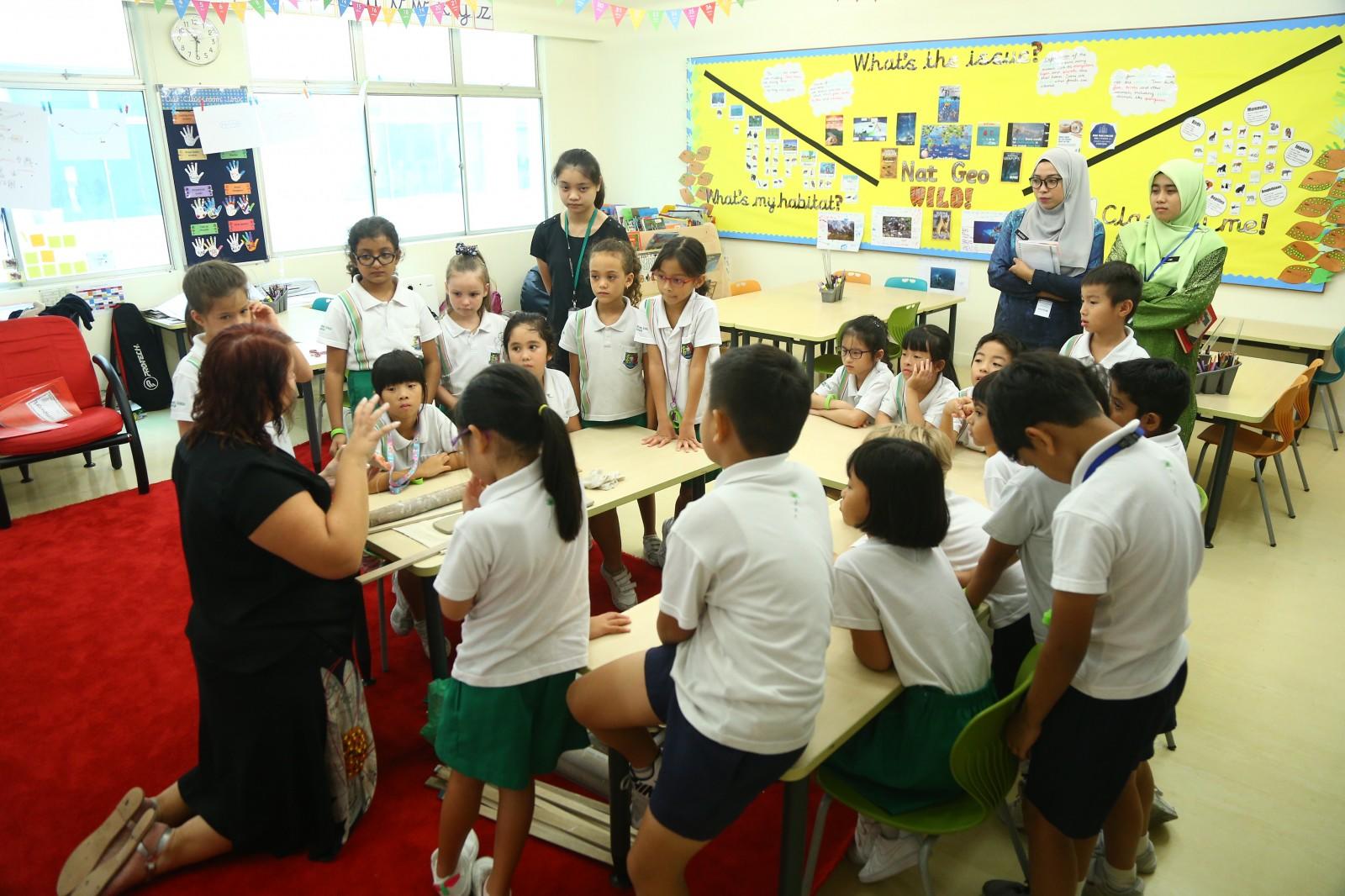Did you know that the earliest written records in Malay were in the form of a southern Indian alphabet? No kidding! Old Malay was greatly influenced by Indian culture, and even contained bits of Sanskrit and Tamil! Today's version of Malay presents itself in mainly two forms of the Latin alphabet, Bahasa Indonesia (the Indonesian Malay language) and Bahasa Melayu (the Malay we use in Malaysia) and Jawi, which is based on the Arabic alphabet.
When we talk about Malay in Malaysia, we are referring to Bahasa Melayu - the country's national language that symbolizes its people's identity. To encourage the use of this national language, as well as to build students' proficiency, the Malaysian education system mandates that students undergo a Malay listening and speaking module. Do you know what kind of topics are being taught to Year 6 students in the module? Let's dive right in!

How students learn Malay in Malaysia?
The Malay listening and speaking skills of Year 6 students are built according to standard methods and techniques that are continuous in the teaching and learning process. Do you know what listening and speaking skills are in Year 6 Malay? Here we explore several of these interesting methods and techniques that encourage students to think, communicate and interact in critical, creative and innovative ways:
- Problem-solving: How do you encourage students to use Malay with their peers and teachers? Problem-solving activities are frequently used in the classroom for active interaction, such as word puzzles, guessing games, quizzes or even applying mathematical skills to real-life situations. The trick is to solve these problems along with using Malay in speech and listening to others use Malay, which builds language skills and enhances critical thinking skills.
- Multiple intelligences: It is vital that Year 6 students remain interested in the topics they are learning in the module in order to better listen and speak Malay. Therefore, this approach caters to the potential of each student's intelligence: be it logical-mathematical, musical, interpersonal or intrapersonal intelligence (and the list goes on!). By recognising that each student has a different intelligence or ability from others, and by catering to these unique potentials, students will feel their talents are welcome and thus gain interest in learning the language.
- Beyond the classroom: How will Year 6 students improve their Malay proficiency if learning is confined only to the classroom? Therefore, a primary school in Malaysia teaching Malay to students would ensure that curriculum activities are provided outside of the physical classroom. These activities are often structured, planned ahead and student-centred as they seek to provide learning experiences in real-life situations. As such, the method strengthens students' understanding of the concepts in listening and speaking Malay, as well as develops social skills and teamwork among students.
- Learning by mastery: Do students have to be good at all the topics covered in Year 6 Malay? A method that is also applied to the module's marking scheme, students are required to master the learning outcomes of a unit, or mastery levels, before moving onto another unit of a higher mastery level. In fact, students need to score at least 80% in the mastery level before even transitioning to the next unit. This keeps students on their toes since the only way for them to climb up the mastery level ladder is by working on their Malay listening and speaking skills.
You can find out more about the marking scheme of the Year 6 Malay listening and speaking module here.

What are the topics in the primary school Malay syllabus?
The curriculum content of the Year 6 primary school Malay syllabus contains elements beyond just the Malay language, and in fact, these elements are adopted from other subjects in the Year 6 curriculum. These elements are the topics that add value to the teaching and learning process, hoping to strengthen skills in preparation for present and future challenges along with the use of the Malay language. Here are the topics you should practise for Year 6 Malay listening and speaking:
- Knowledge: The curriculum content regards this topic as one that covers a vast array of fields and disciplines, which seeks to develop Year 6 students' knowledge and skills in the Malay language. As an example, knowledge in the field of science and geography, as well as knowledge related to current issues, can facilitate discussions and the expression of opinions in Malay.
- Skills: Or to be more specific, listening and speaking skills. However, for these skills to grow, it is essential for Year 6 students to pick up on other critical skills, such as reading and writing skills. Developing these skills provides a holistic approach to learning Malay, enhancing students' knowledge and potential.
- Moral values: As a Southeast Asian, naturally, education places a strong emphasis on moral values, even in Malay language education. As another tool to improve understanding and use of the language, Year 6 students are provided with the guidance and awareness of moral values embedded in the Malaysian community.
- Patriotism: This topic is in conjunction with Malay since it is our national language! As students learn Malay, they will also learn to embody the spirit of love and pride for the country, which indirectly builds their love for the Malay language and a Malaysian identity.
- Sociocultural norms: Upholding the philosophies and traits of the Malaysian community, Year 6 students learn about the sociocultural norms that go hand-in-hand with the Malay language. In this light, students practise sociocultural norms when using Malay, including well-mannered language and Malaysian idioms.
- Science and technology: The knowledge in science and tech, scientific skills and the use of technology in teaching and learning are part of the curriculum to enhance Malay listening and speaking. Having information and communication technology (ICT) skills, for instance, helps students access knowledge through the internet and other media.
- Environmental education: Apart from using Malay for communicating ideas about the environment, this topic looks to instil a sense of love and care in Year 6 students towards the environment. Listening and speaking activities in Malay, therefore, revolve around building awareness and environmental ethics.
- Entrepreneurship: An efficient way to apply the Malay language is through integrating entrepreneurial characteristics and practices among Year 6 students to build a Malay-speaking culture. The teaching of entrepreneurial attitudes and values fosters listening and speaking Malay since the language is popular among local businesses.
You can learn more about the topics in the Year 6 Malay listening and speaking guide here.

How to master listening and speaking Malay?
Now that you know the Year 6 topics when you learn Malay in Malaysia, it's time to master the skills in listening and speaking Malay! You can even look for resources to boost your Malay listening and speaking. Superprof gives you some student tips on improving your Malay listening and speaking:
- Read, read, read: You might've already guessed it, but remember all those topics that are covered in the module? Take this time to read up on the topics in the Malay listening and speaking module and check out Year 6 Malay worksheets so that, even if you experience difficulties with expressing your ideas in Malay, you will be equipped with the knowledge of those topics - you are one step ahead already.
- English? No, Malay subtitles: A fun and quick way to get you picking up the Malay language - try watching your favourite shows (preferably in your mother tongue) with Malay subtitles. Apart from learning Malay pronunciation and intonation, this is also a great way to boost your vocabulary and understanding of the language.
- Formal vs informal: The Malay language emphasizes the use of honorifics and pronouns, but it also stresses when, where and with who you can use certain phrases. For instance, using "kau"(or you, in Malay) with friends is acceptable, but it is considered terribly offensive with elders - you'll have to use "awak" as a formal "you" instead.
- Remember common phrases: Malay happens to have a lot of common phrases (which you can use in both formal and informal situations, thank goodness), so keep them in mind, or even make a list of these phrases if that makes it easier to remember them. Someone speaking Malay too fast? Say "Perlahan sikit, boleh?" (Could you slow down, please?) as a reply!

How can I learn Malay fast?
You've got the tips to improve your Malay listening and speaking, but what's the best way to excel at the language? We've got the answer: learn Malay online! Not only will you be able to learn Malay from experienced teachers, but you can do so at a very affordable cost - here at Superprof.
By signing up for Superprof, you can easily look for Malay tutors on the website - just search through our list of over 270 Malay tutors in Malaysia! You can take a Malay online course right from home because all you have to do is connect with a Malay tutor of your choice, which has also been made simple for you in our tutors' catalogue. We've listed out native speakers, tutoring fees, tutoring services, reviews... you could say that Superprof has the whole package.
If you take a class with Superprof, you can effectively grasp the topics in Malay listening and speaking, while mastering the skills on how to listen and speak the language - you, my friend, are just a few clicks away from the best learning experience.
You can find a Malay language course for foreigners easily on Superprof.
Summarise with AI:















